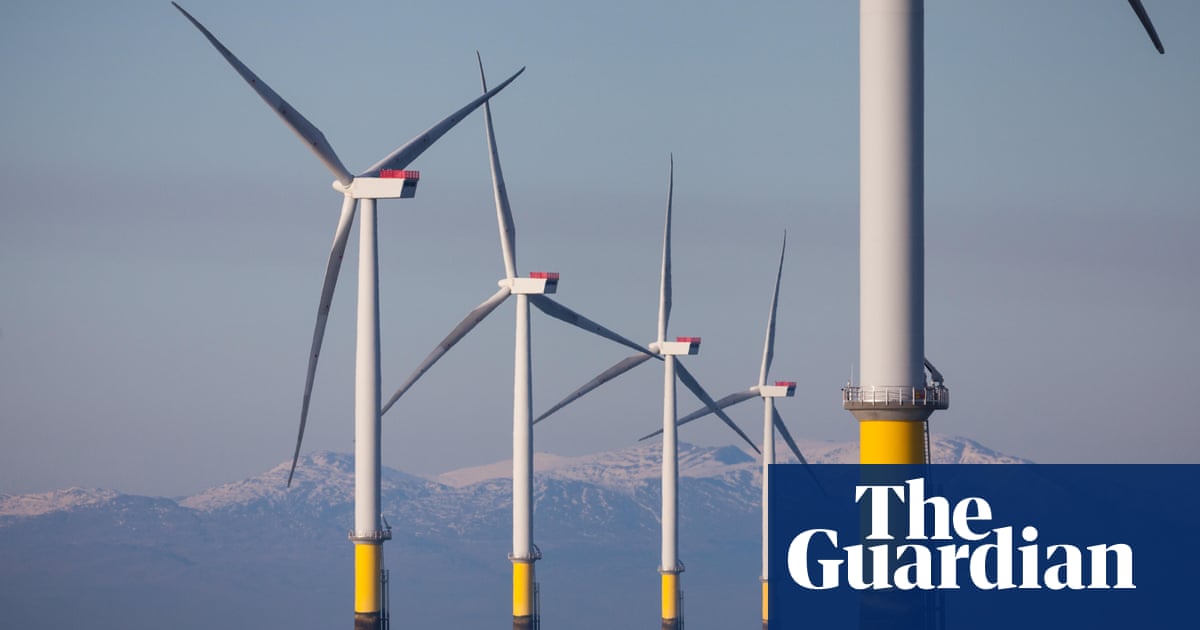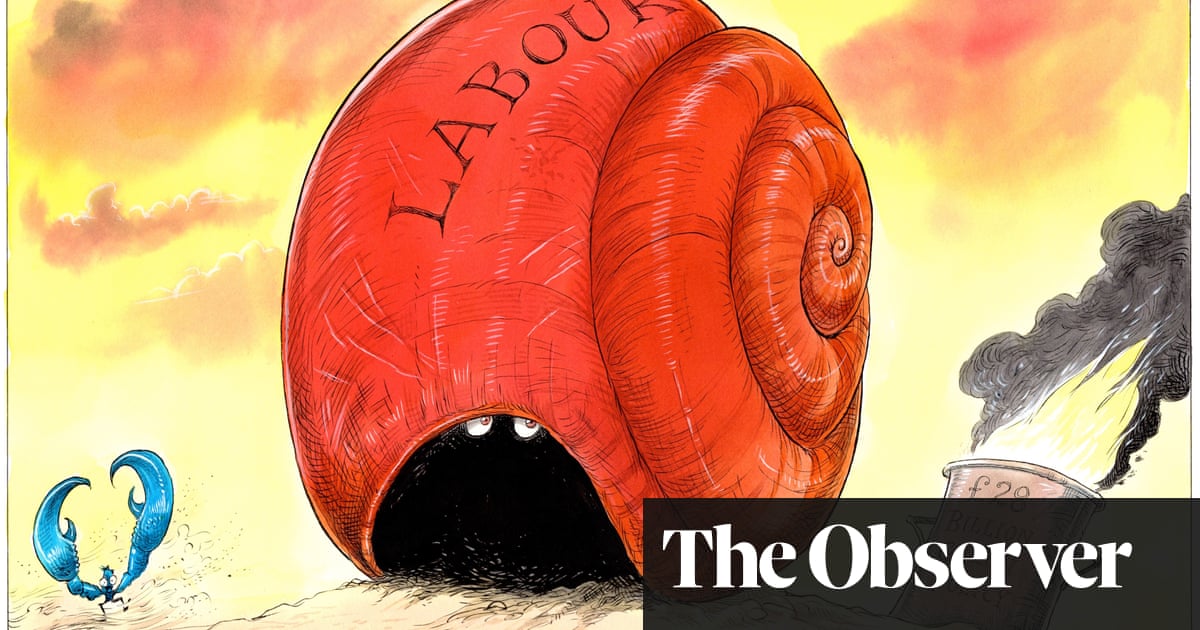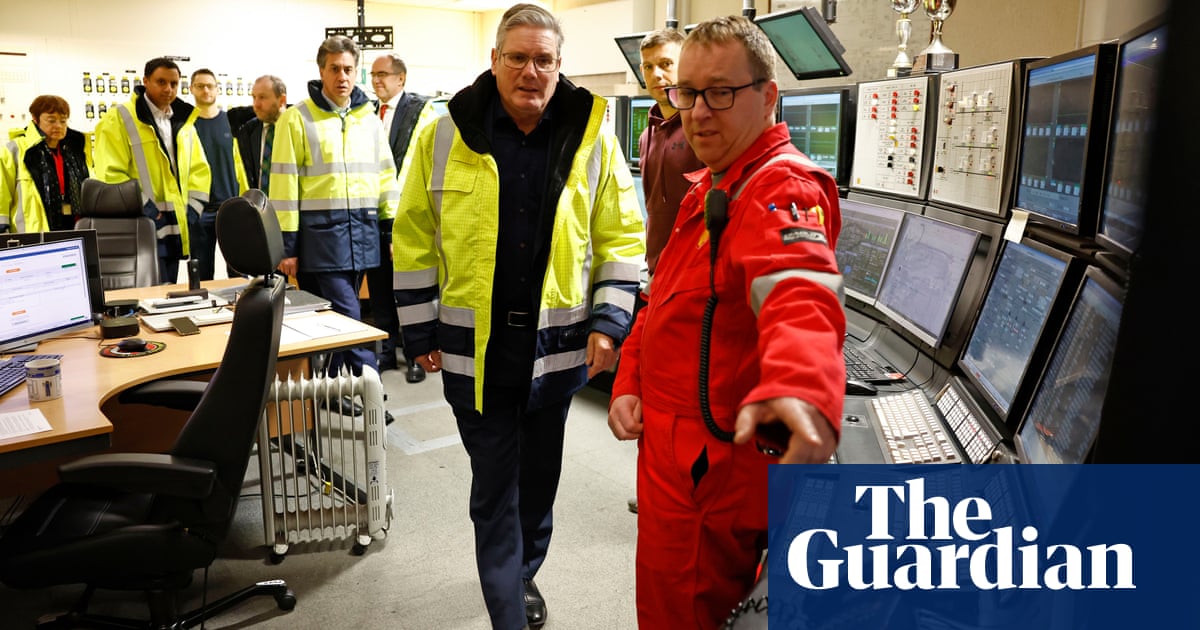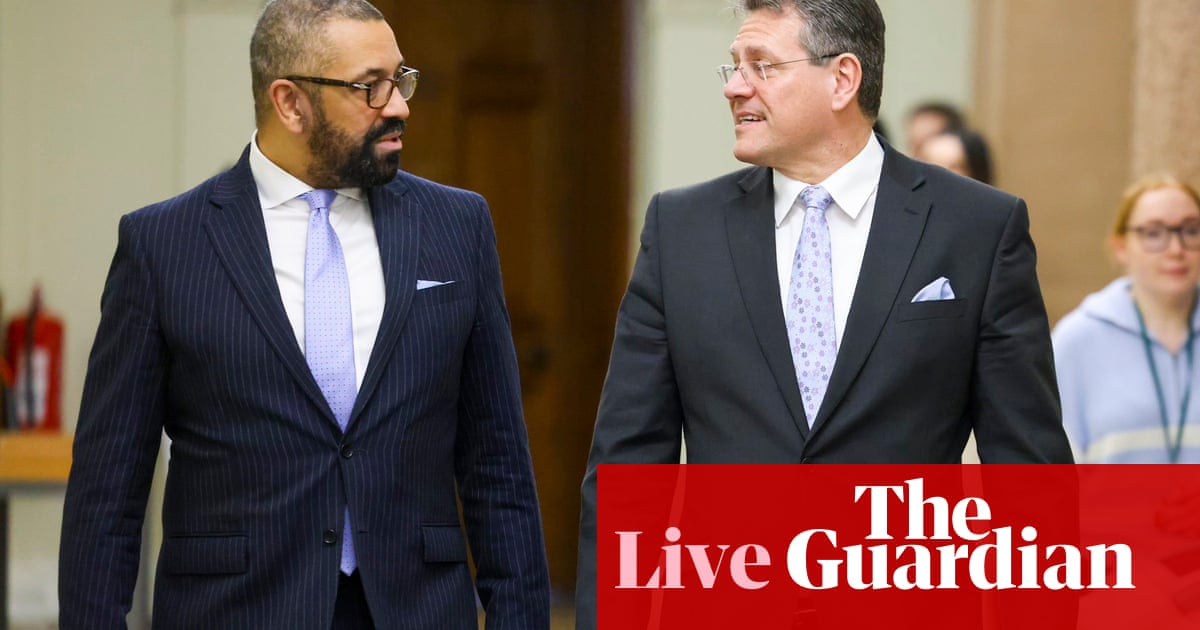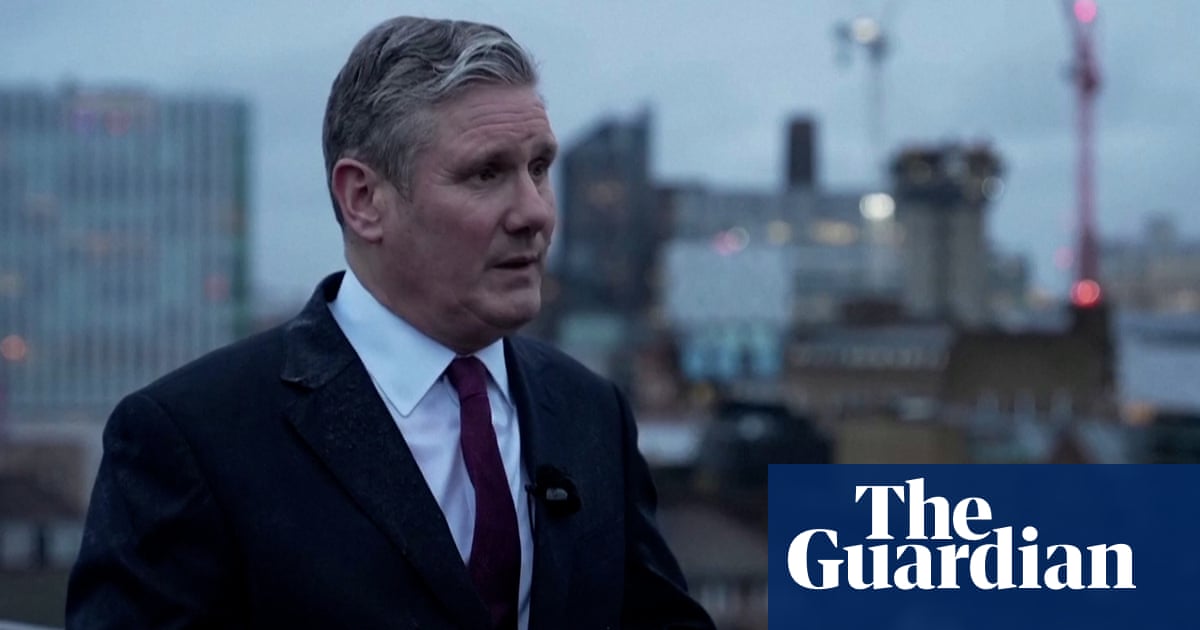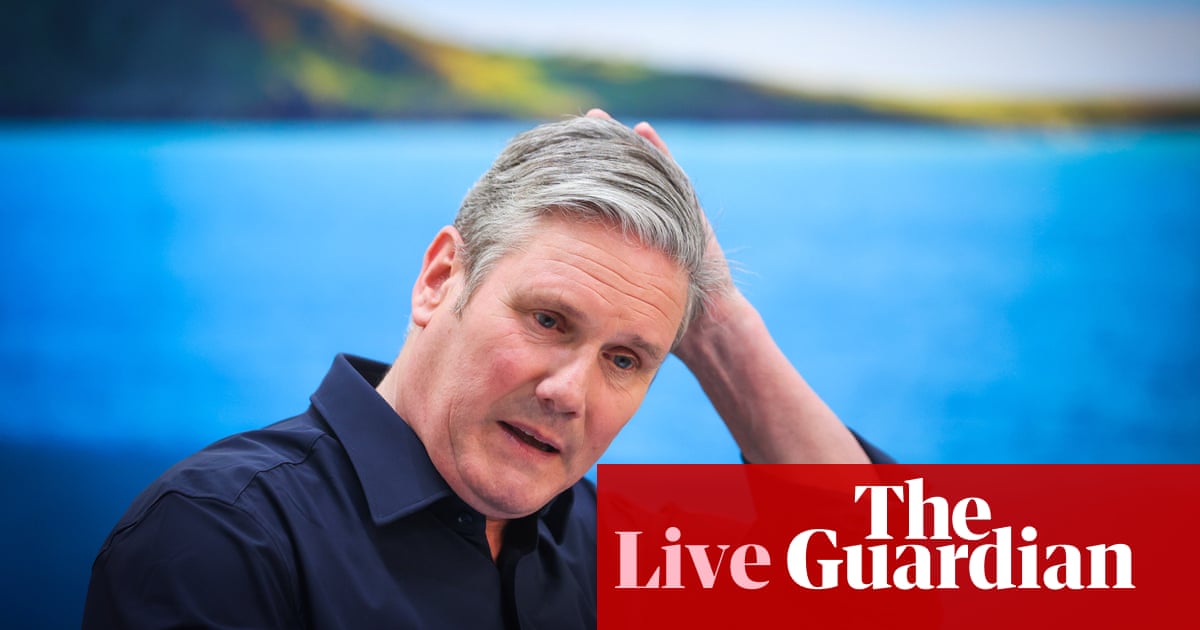
Labour says it won"t be able to spend £28bn per year on green investment because Tories crashed the economy
Labour has confirmed that it has formally dropped its target of spending £28bn a year on green investment. It made the announcement in a briefing to journalists giving new details of its green prosperity plan.
The party said:
Labour has today announced plans to invest in Britain’s future, with Keir Starmer setting out further details of Labour’s mission to kick start growth and deliver clean power by 2030.
As part of the party’s finalisation of policies for a general election campaign, Labour has reconfirmed its commitment to the policies announced through the Green Prosperity Plan, to create jobs, cut bills and unlock investment.
The Green Prosperity Plan will be funded by a windfall tax on the oil and gas giants, and borrowing to invest within Labour’s fiscal rules.
The party also confirmed that, due to the Conservatives’ crashing the economy and Jeremy Hunt’s plans to ‘max out’ the country’s credit card, it would not be possible to reach the previous commitment of £28bn a year.
The centrepiece of the package is Great British Energy, a publicly owned energy company to take back control of the energy system on behalf of the British people.
Afternoon summary
Labour has cut its green investment plans by half, as Keir Starmer ended weeks of speculation to confirm the biggest U-turn of his leadership in a move designed to bolster the party’s chances at the general election. Here is an analysis from Fiona Harvey as to what this means.
And here is an extract:
Estimates from thinktanks and academics suggest 10s of billions a year are needed for the shift to a low-carbon future: the IPPR thinktank came up with a figure of £30bn a year of public investment in a study in 2021, while earlier this year the London School of Economics suggested £26bn a year.
And as a result, the UK is now lagging behind. As Ed Matthew, campaigns director at the E3G thinktank, put it: “A lack of investment in our clean energy transition has left the UK off track to meet our climate targets and uncompetitive in the global clean tech race. Securing climate safety and future prosperity requires a major uplift in public green investment.”
Rishi Sunak has refused to apologise to Brianna Ghey’s father and said it was “sad and wrong” to link his jibe about transgender people to the murdered teenager’s case.
These are from Faisal Islam, the BBC’s economics editor, on what Labour is doing.
Bottom line:
Opposition prioritising ability to attack Government over the rise in mortgage rates as their central election strategy, versus defending an economic strategy of borrowing to invest in a green Industrial Revolution, in a US/ Biden way…
Essentially the strategy here is
Relentlessly saying “Tory Mortgage Premium” is being prioritised over defending “£28bn green borrowing”
This is from Common Wealth, a leftwing thinktank, on Labour’s £28bn U-turn. Its director Mathew Lawrence said:
Labour’s retreat from their green investment plan – on the same day scientists have confirmed last year was a record for global heating – is a deeply disappointing reversal. Our homes will be colder, our energy dirtier, our economy weaker, the transition slower and more expensive as a result. What’s more, the shrinking of ambition is taking place exactly as other countries are pouring record levels of investment into the green industries and jobs of the future.
Despite the U-turn, the outlines of an agenda – GB Energy, clean power by 2030, and green wealth fund – remain. However, if these ideas are to be more than rhetoric, Labour needs a strong commitment to what remains of their plans to delivering serious public investment and deep and meaningful change.
Labour gives details of what"s in green prosperity plan
As well as dropping the £28bn annual target, Labour has also released some details of what is still in the green prosperity plan. Journalists have been given a briefing paper which does not seem to be online yet. A lot of this has been announced before, but some elements are new – in particular relating to the insulation plan, where Labour says there will be “a slower initial roll out than we had hoped to deliver”.
Here are the details. This is a relatively long post, but since there is a lot of comment around these days about Labour not having a plan, given that they have published it, it seems worth showing what it actually says.
Setting up Great British Energy, costing £8.3bn
Labour says:
We will create a new publicly owned company – Great British Energy - to invest in homegrown clean energy across the country and give us real energy independence from foreign dictators.
GB Energy will be headquartered in Scotland. It will accelerate new nuclear and position Britain as a leader in technologies such as floating offshore wind and tidal. It will also partner with the private sector to accelerate the rollout of more mature renewable energy generation technologies such as wind and solar.
We already have public ownership of energy in Britain, just by foreign governments such as the French and Chinese, rather than our own. Great British Energy will aim to emulate the success of domestic energy champions in other European countries.
A Labour Government will capitalise Great British Energy with an initial £8.3bn (inclusive of the £3.3bn Local Power Plan) – over the first parliament, investing in partnership with the private sector.
Having a local power plan, using £3.3bn of the 38.3bn for GB Energy
Labour says:
Whilst the Conservatives block cheap homegrown renewables with an onshore wind ban that is costing families £180 on their bills every year, Labour will back the builders and not the blockers, so that communities in all four nations of the UK can put up wind turbines, solar panels, and other forms of low carbon power to cut bills.
To drive the energy transition and crowd in investment, as part of its initial capitalisation, Great British Energy, Labour’s publicly owned energy company, will partner with energy companies, local authorities and cooperatives to develop 8GWs of clean power by 2030 - double the power of the world’s largest windfarm.
That is why Labour is allocating resources to support local power in partnership with communities. Of Great British Energy’s capitalisation, £3.3bn will be available in grants for local authorities and loans to communities to create one million owners of local power.
Setting up a national wealth fund, valued at £7.3bn
Labour says:
Labour will set up a National Wealth Fund, which will create good well paying jobs in a zero-carbon economy by investing in industries where one pound of public investment can crowd-in a further three pounds of private sector investment.
This plan will help to re-industrialise the UK with hundreds of thousands of good jobs for plumbers, electricians, engineers, and technicians across the country.
A Labour Government will invest £7.3bn in our National Wealth Fund, with investment deployed in every region and nation of the UK, including:
• Steel: investing £2.5bn in a bright future for our steel industry, benefiting communities in Cardiff, Rotherham, Sheffield, Port Talbot and Scunthorpe. This reflects our original £3bn commitment, of which £500m is now in the government’s spending plans. Due to the perilous state of the steel industry, we are accelerating this scheme from over ten years to five.
• Ports: upgrading our ports so they are renewable-ready, with an investment of £1.8bn, which would inject investment into nine clusters, including; Forth and Tay, Humber, East Anglia, Solent, North West and North Wales, Belfast Harbour, North East Scotland, North East England and the Celtic Sea.
• Gigafactories: breaking the ground for new electric vehicle and battery factories, with £1.5bn investment in our automotive heartlands in the West Midlands, the North East, and the South West. This is in addition to the £500m already committed by the UK Government.
• Industrial hubs: decarbonising carbon-intensive heavy industrial hubs in every corner of the country, with an investment of £1bn, benefiting Scotland, South Wales, the Humber, Teesside and Merseyside.
• Hydrogen: channelling up to £500m into green hydrogen manufacturing, which could benefit the North West, Sheffield and the South East.
Taken together, these policies will support the creation of over 200,000 direct jobs and up to 260,000-300,000 indirect jobs over the decade. This will directly address geographical inequalities, with 50,000 new jobs each in both the North West and Yorkshire, as well as 30,000 new jobs each in the North East, the East Midlands, the West Midlands, and the East of England.
The National Wealth Fund will use a range of tools of support, including equity stakes in return for those investments.
British jobs bonus, costed at £500m a year
We will boost investment and jobs in Britain’s industrial heartlands and coastal communities, by rewarding clean energy developers with a British Jobs Bonus if they invest in good jobs and supply chains in those areas.
Labour will allocate a fund of up to £500m per year, starting from the 2026-27 contract for difference auction round, to provide capital grants to incentivise companies developing clean technologies like offshore wind, onshore wind, solar, hydrogen, and carbon capture and storage, to target their investment particularly at the regions that most need it.
Warm homes plan, with £6.6bn on top of the £6.6bn already being spent by the Tories
The national emergency of rising energy bills has again highlighted the urgent importance of insulating as many homes as possible. The UK spends more money on energy wasted through the walls and roofs of our houses than any other country in Western Europe.
Labour’s Warm Homes Plan would start a national programme that will upgrade up to five million of the UK’s 16 million homes below an EPC rating of C over the parliament. Our aim will remain to ensure that every home below EPC C that can be practically upgraded, is done by 2035 - this is aligned with the government’s target, but offers a credible plan.
This programme will go street by street, installing energy saving measures such as loft insulation and low-carbon heating, saving families on low-incomes hundreds of pounds per year, slashing fuel poverty, and getting Britain back on track to meeting our climate targets.
Our investment will be split between: energy efficiency grants, delivered hand-in-glove with local authorities to target the areas and families in most need; government-backed zero-interest loans for green home upgrades like solar panels; and grants to make sure heat pumps are affordable for people who want them. We will work with commercial banks to ensure they offer mortgage products that support retrofit.
This is a slower initial roll out than we had hoped to deliver when we originally planned this policy, due to the fiscal situation. On the Tories’ watch, insulation rates have crashed 90% - one of the reasons the UK had one of the most acute energy price crises in Western Europe.
Proper windfall tax on oil and gas companies
Labour will introduce a proper windfall tax on the excess profits of oil and gas companies, so we can invest in the clean power we need to cut bills for families.
Labour will fix the holes in the Energy Profits Levy by:
• Increasing the rate to 78%, the same rate of tax as in Norway.
• Ending the loopholes in the levy that funnel billions back to oil and gas giants.
• Extend the sunset clause in the windfall tax until the end of the next parliament, provided there continue to be windfall profits.
Together, these changes would raise £10.8bn over the next five years from 2024-25 to help fund the Green Prosperity Plan.
This amount is based on current OBR forecasts. The amount raised will depend on outturn oil and gas prices and production levels, as well as the level of investment and the amount offset against taxation.
Labour has "world-leading agenda on climate and energy", says Ed Miliband, after £28bn target dropped
Labour’s news release confirming the abandonment of the £28bn annual green investment target contains these quotes from Labour figures.
From Keir Starmer
I have changed the Labour party to put it back in the service of working people. Our Green Prosperity Plan is about turning a corner on fourteen years of Conservative decline and investing in Britain’s future. It is a plan for more jobs, more investment and cheaper bills. It’s a plan to get our country’s future back.
From Rachel Reeves, the shadow chancellor
Rachel Reeves, Shadow Chancellor, said:
Labour is ambitious for Britain’s future. There is a global race taking place in the jobs and industries of the future, and we are determined to lead it. All the Conservatives are offering the country is five more years of economic failure that will working people choice. Labour has a plan to invest and to get Britain’s future back.
And from Ed Miliband, the shadow energy secretary, said:
Labour will be fighting the election with a world-leading agenda on climate and energy with every single individual policy already announced now confirmed for the manifesto: Great British Energy, a National Wealth Fund, a Warm Homes Plan, a British Jobs Bonus, a Local Power Plan and no new oil and gas licences as well as our 2030 clean power mission.
It is thought that, of these three, Miliband will have been the one most reluctant to see the £28bn target go, because of his particularly strong personal commitment to the net zero agenda. He has not been doing interviews recently, and the Conservatives have been running a social media campaign suggesting he’s in hiding.
Labour says it won"t be able to spend £28bn per year on green investment because Tories crashed the economy
Labour has confirmed that it has formally dropped its target of spending £28bn a year on green investment. It made the announcement in a briefing to journalists giving new details of its green prosperity plan.
The party said:
Labour has today announced plans to invest in Britain’s future, with Keir Starmer setting out further details of Labour’s mission to kick start growth and deliver clean power by 2030.
As part of the party’s finalisation of policies for a general election campaign, Labour has reconfirmed its commitment to the policies announced through the Green Prosperity Plan, to create jobs, cut bills and unlock investment.
The Green Prosperity Plan will be funded by a windfall tax on the oil and gas giants, and borrowing to invest within Labour’s fiscal rules.
The party also confirmed that, due to the Conservatives’ crashing the economy and Jeremy Hunt’s plans to ‘max out’ the country’s credit card, it would not be possible to reach the previous commitment of £28bn a year.
The centrepiece of the package is Great British Energy, a publicly owned energy company to take back control of the energy system on behalf of the British people.
Gordon Brown defends dropping £28bn green investment target, saying Labour has to show "fiscal discipline"
Gordon Brown has also defended Labour’s decision to drop £28bn as the annual target for spending on green investment. Asked about the move being confirmed today, Brown told LBC’s Tonight with Andrew Marr:
I haven’t seen any official announcement actually. But if that’s what he’s decided, it is because [Keir Starmer] and [Rachel Reeves, the shadow chancellor] have decided that they’ve got to abide by some fiscal discipline, given the state of the public finances.
You have got to remember when we left power in 2010, debt was below 40% of national income. It’s now 100% of our national income, I got criticised for allowing it to rise to 40%. Now it’s 100% and the Conservatives have got to take some responsibility for leaving a mess for the incoming government, whoever it is.
Rishi Sunak deliberately visited a dental practice that’s not accepting new adult NHS patients, Downing Street have said. (See 3.21pm and 3.26pm.)
The prime minister went to Gentle Dental in Newquay to promote his plans to offer cash incentives to dentists to accept more patients as more than 12 million were unable to get an appointment last year.
Sunak insisted the announcements this week will make a significant difference, and quickly”.
When asked if Sunak couldn’t find a practice accepting new patients, the prime minister’s deputy spokesperson said:
The prime minister wants to hear about the challenges surgeries are facing, and the challenges we’re trying to address through our dental plan … It’s right for the prime minister to hear from people on the frontline.
The Labour announcement about the future of the commitment to spend £28bn a year on green investment is coming at 5pm.
Rishi Sunak was in Cornwall today where he visited an dental surgery that does not accept adult NHS dental patients. (See 3.26pm.) He also visited Nancledra preschool where one of the people on the advisory board is Hannah Ray, a former colleague at the Guardian. I know that readers often wonder what the point of these visits is. Hannah was there, and she has been wondering about it too. She sent me this.
Rishi Sunak visited our preschool today, and completely missed the point. He did a puzzle with one of the children, looked at the guinea pigs, looked at the garden, and then took questions from the local press.
But while the press asked about second homes, his response to Brianna Ghey comments made at PMQs, and local council funding, no one – including the PM – seemed at all interested that the very preschool he was sitting in is under constant threat of closure due to lack of government funding into early years provision and lack of investment in early years staff training and incentives.
Government funding is now available for nearly all two-year-olds. However, the living wage has gone up by 9.8%. Staff are barely paid above the minimum wage yet have the biggest responsibility, working long hard hours to care for the most vulnerable people in society. The preschool is bursting at the seams with working parents wanting to get the childcare they need, but there aren’t the spaces.
Why did Rishi visit our preschool, in one of the most under-funded areas of the country, and one of the most deprived, if he didn’t really care about how it was doing?
Gordon Brown says he apologised as PM when he made mistakes, and Sunak should too
The former prime minister Gordon Brown has added his voice to those saying Rishi Sunak should apologise for his anti-trans jibe at PMQs yesterday. Asked about it in an interview for Sky’s Politics Hub with Sophy Ridge, Brown said:
Well, when I made mistakes, I did apologise. And look, every prime minister makes mistakes. I don’t think you can say that every prime minister will fail to make some mistakes, but I think you should apologise if you get things wrong and I mean it is a very sad and really tragic, tragic case of a family in grief.
I know he’s said he’s compassionate about the family, but perhaps he should do what I had to do on one or two occasions and apologise. And I do accept that if you make mistakes, you’ve got to correct them quickly.
Brown was giving an interview to highlight his concern about rising levels of extreme poverty in Britain, and his proposals for what should be done to address this. He has written about this in an article for the Guardian.
John Crace’s sketch is up, and it’s about Chris Philp’s media round this morning. You can read it here.
Nick Candy, a major Tory donor, thinks it is time for a Labour government, Alex Wickham from Bloomberg reports. He has posted about this on X.
Exclusive
— Property tycoon Tory donor Nick Candy says it’s “time for a change” of government to Labour
— praises Keir Starmer’s engagement with business
— blasts years of Tory infighting
— Nick Candy attended the PopCon launch two days ago with his wife Holly Valance
— he gave the Tories £100,000 in 2020 and backed Shaun Bailey for London mayor
— today he says it’s “probably time for a change” of government to Labour
— Candy criticises Labour’s private schools tax policy but praises Starmer
— he says: “we still don’t know the Labour policies, but do I think Keir Starmer is a decent man with good values and good morals? 100 percent”
Last week Helena Horton revealed that water company bosses and the chairs of the regulator Ofwat and the Environment Agency had a dinner together at an exclusive private members’ club to discuss issues like rising bills and sewage spills. Helena found out about this using a freedom of information request.
But this came as a surprise to the Liberal Democrats, because the party had also submitted FoI requests to try to find out what hospitality the Environment Agency boss has been receiving and this dinner was not disclosed. The Lib Dem MP Tim Farron suspects some sort of cover up, and he has written to Sir Laurie Magnus, the PM’s ethics adviser, to ask if the Department for Environment, Food and Rural Affairs, which is responsible for the Environment Agency, is in breach of the ministerial code. He has posted the letter on X.
Enough is enough. This is starting to stink of a cover up. I’ve called for an investigation into a possible breach of Ministerial code. DEFRA & EA are refusing to comply with requests for information. Maybe this cosy club between water firms & officials is worse than we feared
went for dinner at an exclusive private members’ club to discuss how to quell public anger over bill rises and sewage spills, the Guardian can reveal.
Scottish government to consider levy on shops to claw back profits from minimum unit price for alcohol as it rises by 30%
Scottish ministers are considering a new public health tax on shops after increasing the minimum price for alcohol by 30% in an effort to combat Scotland’s rising alcohol-related deaths and hospitalisations.
Shona Robison, the deputy first minister, confirmed a Guardian story earlier this week that the minimum unit price (MUP) will increase from 50p a unit to 65p, to keep pace with inflation and maintain fiscal pressures on alcohol abuse.
The new price will come into force on 30 September; it means a basic bottle of whisky will now cost £18.20, up from £14. “Alcohol harm remains a significant issue in Scotland,” she said. “It continues to contribute to worsening health outcomes,” particularly for men in deprived areas.
Scotland’s finance secretary, Robison also confirmed that ministers are considering demands for a new public health levy to claw-back the excess profits that shops earn from MUP, although she said the government already spends £112m a year on alcohol and drug treatment units.
The Fraser of Allander Institute at Strathclyde university estimates retailers have earned around £30m a year in unearned profits from MUP because they keep the difference between the higher price paid for drinks and the wholesale price of the product.
Scottish Labour and public health charities argue the case for a claw-back is now even greater; a higher 65p minimum price means higher unearned profits. Labour said the levy’s on proceeds should be spent on alcohol treatment and recovery projects.
Robison said they were consulting businesses and health experts on doing so, with a decision due before the next Scottish budget later this year. Scotland had a public health levy on large retailers between 2012 and 2015, which raised £95m.
The Scottish Retail Consortium said it welcomed the increased unit price but was furious at the prospect of an “unevidenced and unreasonable” new levy. “Any mooted tax rises are nothing more than a thinly veiled cash grab at the expense of an industry already under immense pressure,” it said.
Liz Truss is going to publish her book, Ten Years to Save the West – Lessons from the only conservative in the room, on 16 April, the publishers, Biteback, have announced.
In a news release about it, they say:
In Ten Years to Save the West, former prime minister Liz Truss reflects on the battles she fought – and too often lost – against the establishment during her ten years in government and sets out what conservatives and their allies across the western world must do in the years ahead if hostile regimes and increasingly extreme left-wing ideologies are to be defeated …
Ten Years to Save the West offers a timely warning about the perils facing conservatism in the years ahead if the agenda continues to be set in so many institutions – from the media to academia and the corporate world – by those espousing extreme ideologies, from the net zero zealots to the radical trans activists questioning basic scientific facts. If the west is to preserve the economic and cultural freedom and institutions that it holds so dear, Truss’s warnings need to be heeded.
Truss has secured a plug for her book from Boris Johnson, her predecessor, who says:
Liz Truss is right about one big thing – the old establishment economic models are failing. That’s bad news for the entire western world. And she is right that the last thing any of us now needs is more socialism, more taxes and more regulation. We need to reject that tiresome refrain of the global left and instead pursue an agenda that unleashes enterprise and boosts economic growth. I commend this invigorating tract!
The British Dental Association says that, in visiting a dental practice that is not taking new adult NHS patients (see 3.21pm), Rishi Sunak was seeing what the reality is for millions of people. The BDA’s chair Eddie Crouch said:
Rishi Sunak is seeing what life is like for millions across this country. The difference is he has options
The PM won’t have to queue around the block to get an appointment. He won’t face travelling hundreds of miles for care. He’ll never find himself reaching for a set of pliers.
The paucity of the government’s plan means many patients will keep facing these horrific choices.
The BDA has been fiercely critical of the government’s dental recovery plan published yesterday, saying it is “incapable of even beginning to honour Sunak’s promise to ‘restore’ NHS dentistry, or in any way meet the government’s stated ambition to provide access to NHS dentistry for ‘all who need it’”.
The dental practice Rishi Sunak visited in Cornwall today to promote his government’s dentistry plan is not accepting new adult NHS patients, PA Media reports. PA says:
The prime minister met staff and patients at Gentle Dental in Newquay on Thursday.
He told broadcasters that “it hasn’t been easy enough for people to access NHS dentistry over the past couple of years” but claimed “the announcements this week will make a significant difference, and quickly”.
“It’s a very significant new investment in dentistry so that everyone can get the access that they need,” Sunak said.
But the practice’s website states that it is not taking on new adult NHS patients or those entitled to free dental care.
Esther Ghey, whose daughter Brianna was murdered and who was in parliament yesterday when Rishi Sunak made an anti-trans jibe at PMQs, has said she does not want to comment on the row.
In a post on Facebook page of the Peace & Mind UK campaign she set up in her daughter’s memory, she wrote:
I don’t wish to comment on reports of wording or comments recently made. My focus is on creating a positive change and a lasting legacy for Brianna.
Through Peace & Mind, we want to improve lives by empowering people, giving them the tools they need to build mental resilience, empathy and self-compassion through mindfulness. In developing these skills, I hope that we can create a more understanding, peaceful and stronger society for everyone.
119 schools in England affected by Raac will have buildings replaced, DfE says
The government has announced that 119 schools and colleges in England affected by reinforced autoclaved aerated concrete (Raac) will have buildings replaced as part of its long-term school rebuilding programme.
In a written statement, Gillian Keegan, the education secretary, said:
Our priority will always be to ensure the safety of pupils and staff, which is why we took a cautious approach for schools and colleges. Although the technical advice does not recommend removal in all cases where it is present, we have taken a precautionary approach for the education estate in England to remove Raac.
The Department for Education said its national survey of schools and colleges, with buildings dating from when Raac was widely used in construction, was now complete. Its final update added three more, including Barking and Dagenham College, a further education college in east London, and Thornleigh Salesian College, a secondary school in greater Manchester.
The DfE said that of the 234 found to have Raac-infested buildings, 119 are to get new buildings through its rebuilding programme, while 110 will receive grants to renovate or remove the affected parts. It said that “a small number” are still carrying out additional checks.
There are roughly 500 schools in England awaiting rebuilds, with about 50 completed every year, meaning that some schools could be waiting for several years before the work is completed.
Geoff Barton, general secretary of the Association of School and College Leaders, said the rebuilding effort was welcome but raised further questions over funding. He said:
Given the severe pressures on the school estate as a whole, we need assurances that this work will be funded wholly through additional capital expenditure and money will not be diverted from other sources. There must also be clear timelines set out for when this work is going to be completed.
The Raac crisis was exposed at the end of last summer, after the government received further evidence that buildings including Raac were in danger of decay and collapse. By the end of August, days before the start of the new school year, the Guardian revealed that the DfE was telling schools to make contingency plans against the risk of collapse. It then abruptly ordered more than 100 schools to close.
Paul Whiteman, general secretary of the National Association of Head Teachers, said:
While dealing with Raac is crucial, we really need to see more ambitious investment from the government to bring the schools estate up to scratch overall – from Raac, to asbestos, to general disrepair – it needs a plan to tackle all school building issues before they become the next big crisis. That can’t happen without more money from the Treasury.
No-fault evictions up 49% in England year-on-year as campaigners complain renters reform bill being stalled
Campaigners have criticised the government for delaying plans to ban no-fault evictions as new figures show a steep rise in repossessions in England, PA Media reports.
The latest statistics published by the Ministry of Justice show that some 26,311 accelerated possessions have been made from the second quarter of 2019 until the end of 2023.
Landlords can apply for an accelerated possession order if their tenants have not left by the date specified in a section 21 notice. Section 21 of the Housing Act allows no-fault evictions.
There were 9,457 such repossessions last year, up from 6,339 in 2022 – a 49% rise.
As the figures were released, Commons leader Penny Mordaunt outlined upcoming business in parliament but made no mention of the renters (reform) bill.
Labour’s Lucy Powell, responding in the Commons, complained that the report stage of the bill “was promised by early February, but it’s nowhere to be seen”.
In a statement, the party’s shadow minister for housing and planning, Matthew Pennycook, said: “The stark rise in section 21 notices served last year lays bare the devastating impact that the Tories’ failure to abolish them is having on hard-pressed renters.”
He vowed that if the government does not “get on and quickly pass the Bill abolishing section 21 evictions, that the next Labour government “will get the job done”.
Tom Darling, campaign manager of the Renters’ Reform Coalition, described the bill as “on life-support after being deprioritised by the government”.
Polly Neate, chief executive of Shelter, said: “It’s utterly shameful that the government is bowing to vested interests while renters are marched out of their homes in t






